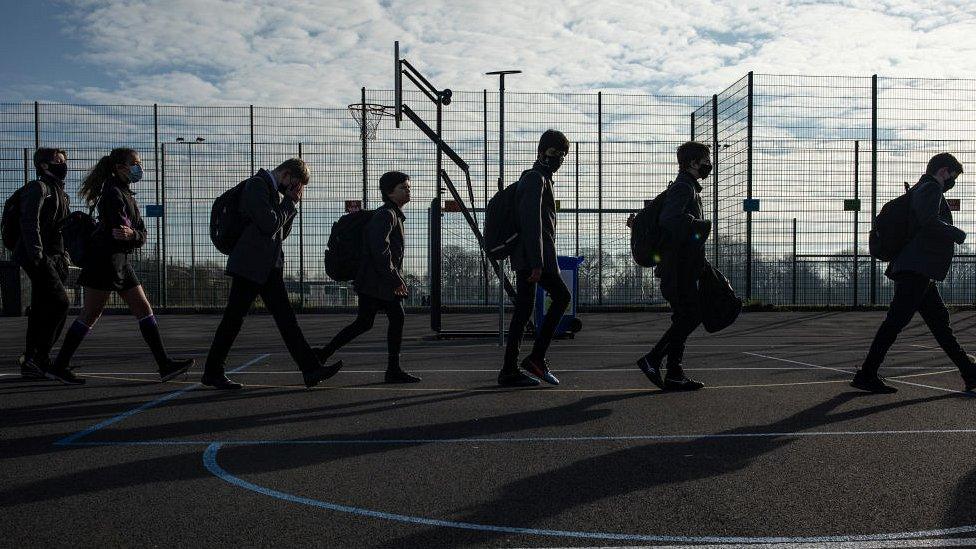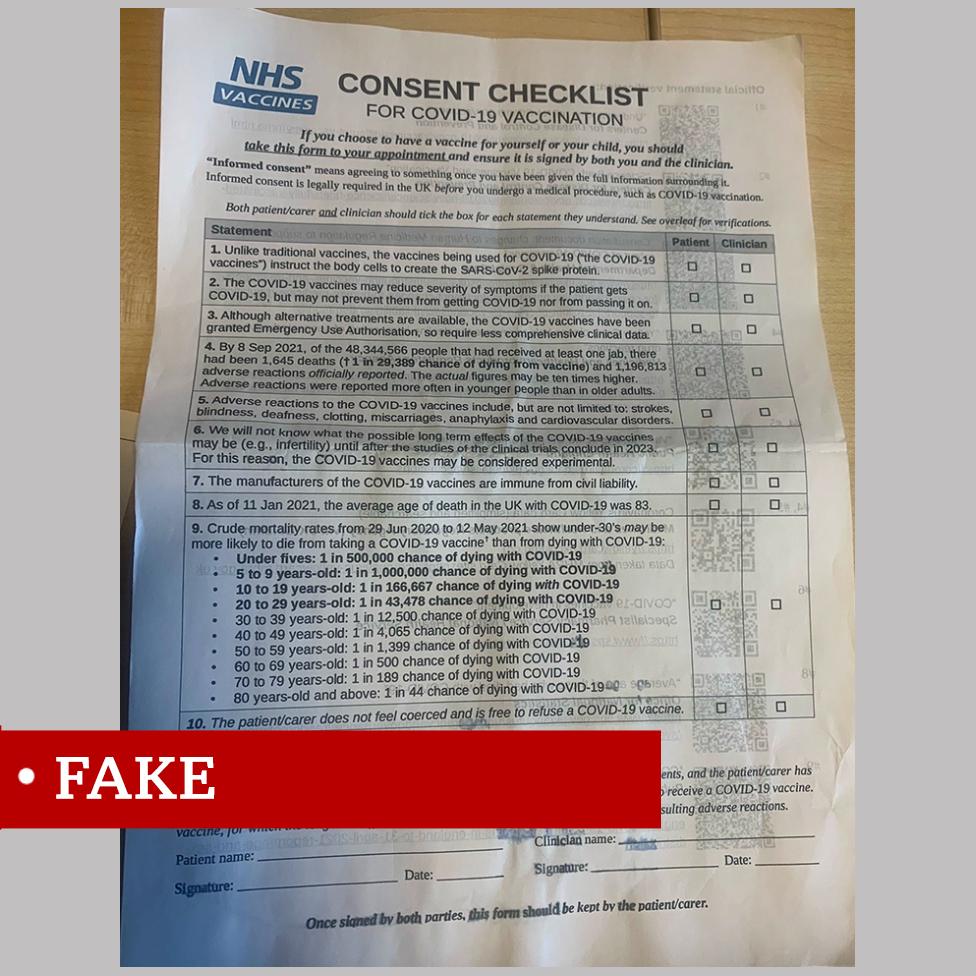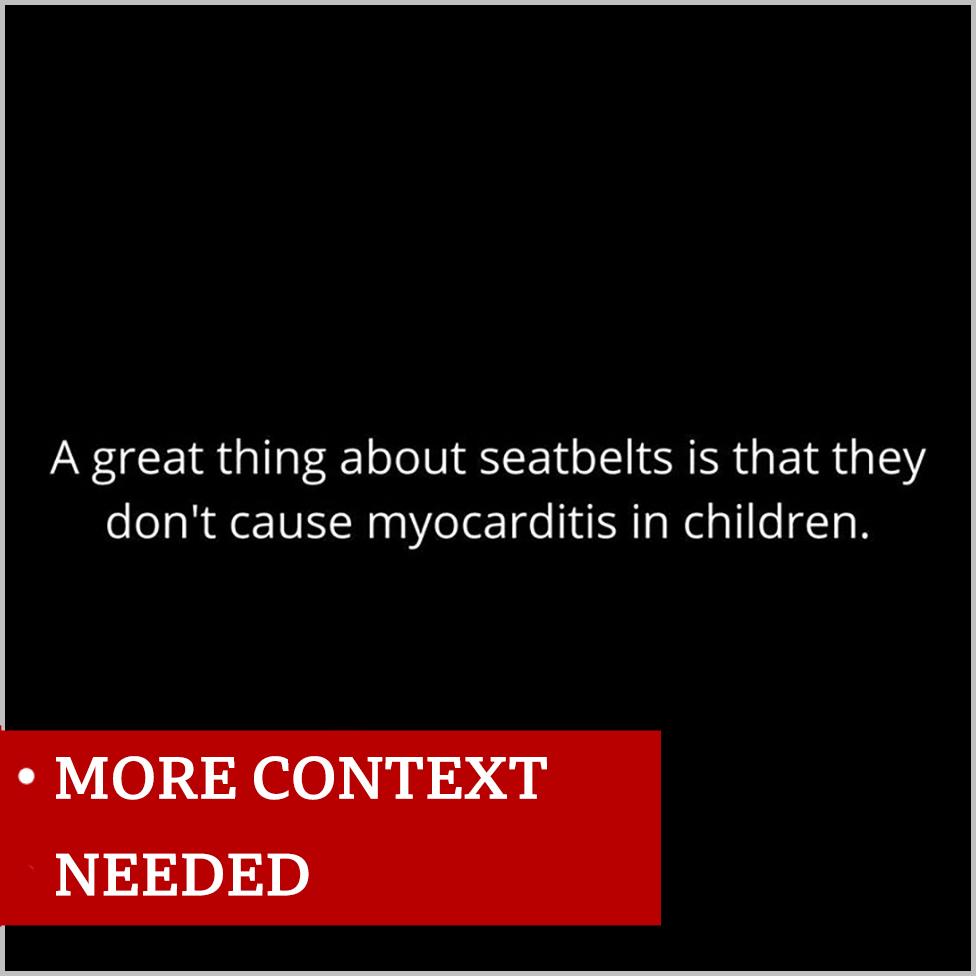Covid: Misleading vaccine claims target children and parents
- Published

Campaigners have been gathering outside schools, handing out what they claim are legal documents or "notices of liability" to head teachers, warning them not to vaccinate children.
Before the government's decision to extend the UK Covid vaccination programme to 12- to 15-year-olds was announced, debate simmered over whether the jab should be offered to healthy children, who are at a much lower risk from the virus than older age groups.
But alongside genuine discussion, campaigners opposed to the vaccine have been spreading misinformation.
Fake consent form
A fake vaccine-consent letter, pretending to be from the NHS, was sent to schools in England.
The letter falsely stated there was a "one in 29,389 chance of dying from the vaccine", comparing that with children's extremely low risk of death from the virus.

The figure appears to have been taken from the Medicines and Healthcare Products Regulatory Agency's Yellow Card scheme, for people to report any suspected side-effects after vaccination.
Roughly 49 million people have had at least one vaccine dose and about 1,600 deaths have been logged in the scheme so far.
But someone dying after a jab does not mean the vaccine is responsible.
People die from all sorts of causes every day and most of the adult population has now been vaccinated, including the vast majority of those most at risk of death - the elderly or those with underlying illnesses.
The MHRA investigates the reported side-effects, including deaths, to see whether they are higher in vaccinated people than would be expected in the population normally - which, generally, they have not been.
As of August, the Office for National Statistics (ONS) had recorded nine deaths to which the vaccine was found to have contributed, five of which had the vaccine as the underlying cause.
This was determined by doctors who examined the patient and had access to their medical records and test results.
That suggests a one in five million risk of dying.
On the other hand, the risk of dying of Covid if you are unvaccinated has been estimated at 0.8% or 35,000 deaths per five million for all ages.
And there have been 161,000 deaths so far where Covid was judged to be an underlying cause, including at least 76 children, according to ONS records.
The UK's Joint Committee on Vaccination and Immunisation (JCVI), which produces recommendations for government, said the benefits for 12- to 15-year-olds from the vaccine were marginally greater than the risks but acknowledged that "there is considerable uncertainty regarding the magnitude of the potential harms".
The form also suggests the vaccine may not stop people catching Covid or passing it on.
In fact, the vaccine reduces the chances of catching the virus by about half and, even if someone does catch it, reduces the amount of virus in the system, making it less likely they will pass it on.
Claims about myocarditis
Teenage boys' very slightly but genuinely elevated risk of developing a condition called myocarditis - inflammation of the heart - after vaccination has been highlighted by campaigners opposed to Covid jabs.
They emphasise these rare negative events from the vaccine while downplaying the risks to children of catching the virus - including "long Covid".
Most cases of myocarditis after vaccination were resolved quickly following treatment.
It is a case of balancing risks.

A meme circulating online riffs on a common comparison of the vaccine to seatbelts as a risk-reduction tool
The JCVI estimates a single first dose of the Pfizer vaccine prevents 87 Covid-related hospital admissions per million children but comes with a risk of three to 17 cases of vaccine-induced myocarditis per million children.
The second dose is estimated to prevent a further six hospital admissions per million but comes with the risk of a further 12 to 34 cases of myocarditis - which is why the chief medical officers decided to recommend just one dose.
Myocarditis is actually more common after catching Covid than after the vaccine.
But the MRHA says it is important anyone who experiences a "new onset of symptoms such as chest pain, shortness of breath or feelings of having a fast-beating, fluttering, or pounding heart" after the vaccine seeks medical attention.
Co-ordinated campaign
It is difficult to pin down how many people are actively campaigning against the vaccine for children - but there is evidence it is fewer than they would like people to think.
Several seemingly grassroots groups have sprung up appearing to be operating separately - but they seem to consist of a relatively small number of overlapping members.
Leaked chat logs from the anti-lockdown Health Advisory and Recovery Team show members discussing putting their message against vaccines out under the banner of another organisation, the UK Medical Freedom Alliance, "if it is too inflammatory for Hart".
Another member discussed sharing research from a third vaccine-detracting body, the British Ivermectin Recommendation and Development Group, because "psychologically this then looks like two groups of professionals agreeing with each other (making the content more believable as it looks like two separate groups)".
Members of these organisations also have links to Us for Them, which says it represents parents, and the campaign group Safer to Wait.
Safer to Wait's founder can be seen in the leaked Hart members chat, asking the group to distribute the group's leaflet with misleading claims about the vaccine to primary-school parents.
These campaigns appear to be having a wide reach, with protests at schools across the UK.
Clarification: This piece was published on 13 October and was updated on 14 December to add more detail on the JCVI's position on teen vaccination.